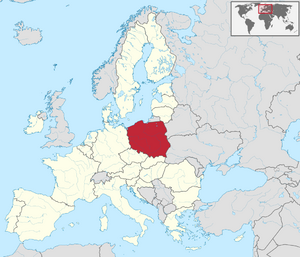Poland: Difference between revisions
(I wrote the article essentially.) |
Harrystein (talk | contribs) (some rephrasing and minor adding.) |
||
| Line 1: | Line 1: | ||
{{Infobox country|englishname=Republic of Poland|nativename=Rzeczpospolita Polska|flagfile=Flag_of_Poland.webp|emblemfile=Coat_of_arms_of_Poland.png|mapfile=Poland_in_European_Union.png}} | {{Infobox country|englishname=Republic of Poland|nativename=Rzeczpospolita Polska|flagfile=Flag_of_Poland.webp|emblemfile=Coat_of_arms_of_Poland.png|mapfile=Poland_in_European_Union.png}} | ||
[[category:states]] | [[category:states]] | ||
'''Poland''' (Polish: ''Polska'' [ˈpɔlska]), officially the '''Republic of Poland''', is a [[ | '''Poland''' (Polish: ''Polska'' [ˈpɔlska]), officially the '''Republic of Poland''', is a [[capitalism|capitalist]] [[state]] in [[Central Europe|Central]] [[Europe]]. It has a population of over 38 million. Warsaw is the nation's capital and largest metropolis. Poland is a member of the [[European Union]] and [[NATO]]. The country has a long history of [[Marxism|Marxist thought]] and is the home of [[Rosa Luxemburg]], [[Michał Kalecki]], and other important leftists.<!--Add other examples--> Polish nationalists were among the founding members of the [[International Workingmen's Association]]. | ||
Poland's modern history has largely been shaped by lengthy periods of [[Imperialism|domination by other countries]], most notably its neighbours | Poland's modern history since the 17th century has largely been shaped by lengthy periods of [[Imperialism|domination by other countries]], most notably its neighbours [[Russia]] and [[Federal Republic of Germany (1990–present)|Germany]]. In September 1939, the invasion of Poland by the [[Nazi Germany|Third Reich]] and the [[Union of Soviet Socialist Republics|Soviet Union]] under the terms of the [[Molotov–Ribbentrop Pact]] marked the beginning of [[World War II]]. After the war, Poland became a ''de facto'' Soviet satellite state within the [[Eastern Bloc]] and was a founding member of the [[Warsaw Pact]]. Plagued by economic turmoil, the Polish People's Republic saw numerous large-scale mass strikes, such as the ones in June 1956, March 1968, December 1970, June 1976, August 1980 and December 1981. | ||
The 1988 strike resulted in the Round Table talks and the first semi-democratic elections in 1989. In the 1990s, Poland transitioned from [[Marxism–Leninism | The 1988 strike resulted in the Round Table talks and the first semi-democratic elections in 1989. In the 1990s, Poland transitioned from [[Marxism–Leninism]] to a capitalist system. Recently, the country has seen a rise in [[Reactionary politics|reactionary]] and [[Conservatism|conservative]] moods under the tenure of the Law and Justice party, which effectively gained control of many institutions, most notably the Supreme Court and state broadcaster. | ||
Revision as of 19:26, 8 December 2023
| Republic of Poland Rzeczpospolita Polska | |
|---|---|
Map of Republic of Poland
| |

|

|
| Flag | State Emblem |
Poland (Polish: Polska [ˈpɔlska]), officially the Republic of Poland, is a capitalist state in Central Europe. It has a population of over 38 million. Warsaw is the nation's capital and largest metropolis. Poland is a member of the European Union and NATO. The country has a long history of Marxist thought and is the home of Rosa Luxemburg, Michał Kalecki, and other important leftists. Polish nationalists were among the founding members of the International Workingmen's Association.
Poland's modern history since the 17th century has largely been shaped by lengthy periods of domination by other countries, most notably its neighbours Russia and Germany. In September 1939, the invasion of Poland by the Third Reich and the Soviet Union under the terms of the Molotov–Ribbentrop Pact marked the beginning of World War II. After the war, Poland became a de facto Soviet satellite state within the Eastern Bloc and was a founding member of the Warsaw Pact. Plagued by economic turmoil, the Polish People's Republic saw numerous large-scale mass strikes, such as the ones in June 1956, March 1968, December 1970, June 1976, August 1980 and December 1981.
The 1988 strike resulted in the Round Table talks and the first semi-democratic elections in 1989. In the 1990s, Poland transitioned from Marxism–Leninism to a capitalist system. Recently, the country has seen a rise in reactionary and conservative moods under the tenure of the Law and Justice party, which effectively gained control of many institutions, most notably the Supreme Court and state broadcaster.
